Top 9 Turkish Culture, Customs and Etiquette
Turkey is home to many unique customs and rituals that you can't find anywhere else. Here is a list of Turkish culture, customs and etiquette including the ... read more...most interesting that you should not miss.
-
Water and dry cat food bowls can be found along the sidewalks and the sides of buildings everywhere. The cats are not formally adopted; instead, they are cared for by a large community of cat lovers. Don't be surprised if one climbs into your lap. They are so common that you can find them at a café table, lying behind cars, slinking between graveyards, and sunbathing on benches.
Turkey's affinity for cats has enigmatic origins. However, one of the reasons cats are so well-treated could be related to Islam. Cats are permitted to enter homes and places of worship because they are thought to be clean creatures. A well-known hadith (Muhammad's sayings) describes a woman who was sentenced to hell for failing to feed and water her cat. Watch "Kedi," a wonderful film that follows seven street cats and the people who care for them, to learn more about Istanbul and its unique relationship with cats.
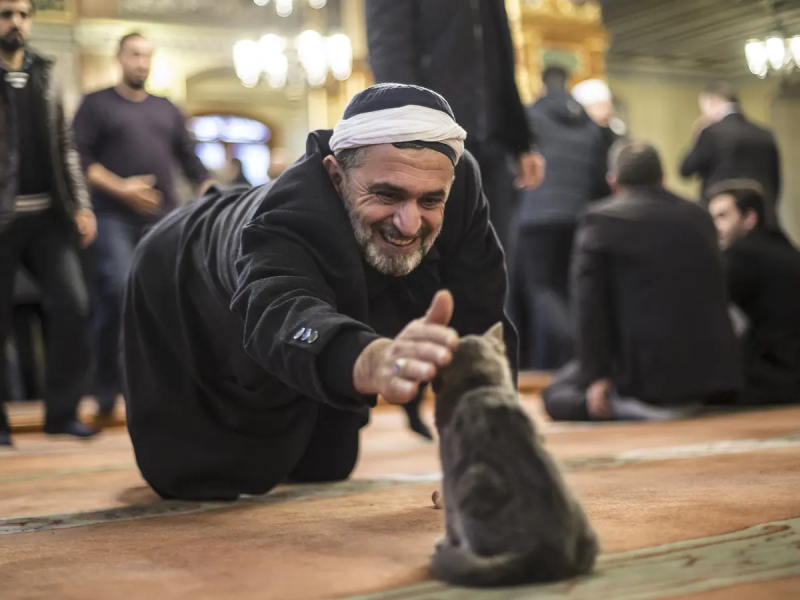
theguardian.com 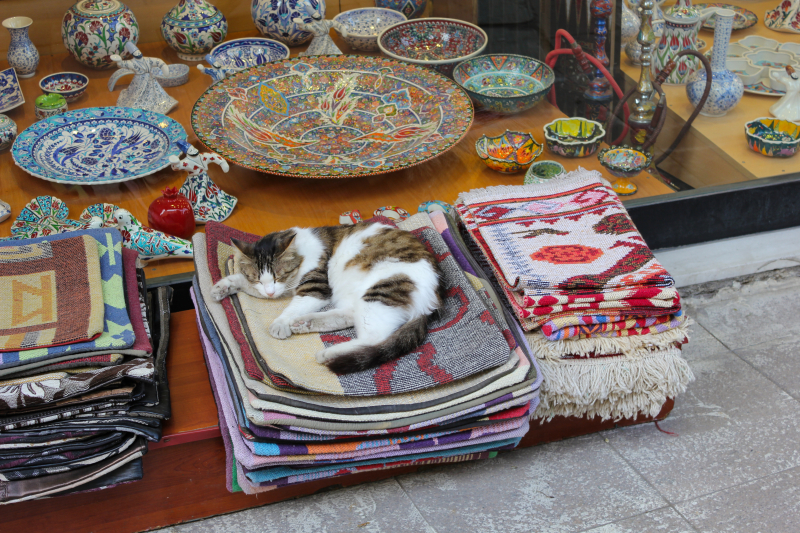
travelatelier.com -
In Turkey, men greet one another by shaking hands and maintaining eye contact. A firm handshake is proper. Hugs and gentle pats on the back are common gestures between close friends and family. Other men may kiss both cheeks. Men may also greet one another by touching their temples, as in a political party greeting. While women may greet each other with gentle handshakes on first meetings, close friends frequently kiss each other's cheeks while lightly hugging.
The best advice for a man greeting a lady is to follow the other's lead. Shake their hand if they extend it. If they offer you their cheek, kiss both of them. If you cannot extend your hand, simply nod or say "Merhaba" (hello) respectfully. A person's faith may prohibit them from touching someone of the opposite sex. Many everyday and special occasion terms are used. "Kolay gelsin," which means "May it be easy for you," is a unique Turkish phrase with no English equivalent. This is an excellent way to recognize the efforts of another person, even a stranger on the street who is working on a project.
When you enter a shop, cafe, or any other establishment, you may hear "Hos Geldiniz," which means "welcome." "Geçmiş Olsun" is a genuine "Get well soon" wish for someone who is ill. In Turkey, a backward tilt of the head, frequently accompanied by raised eyebrows or simply raising the eyebrows alone, denotes "no," whereas in most other countries, a nod denotes "yes." Placing one's hand on the heart or towards the chest region is a common gesture in Turkey. This gesture is used to express gratitude as well as to express greetings. In a Turkish restaurant, customers will ask for the bill by combining their index and thumb and making a "writing on the air" gesture with their fingers.
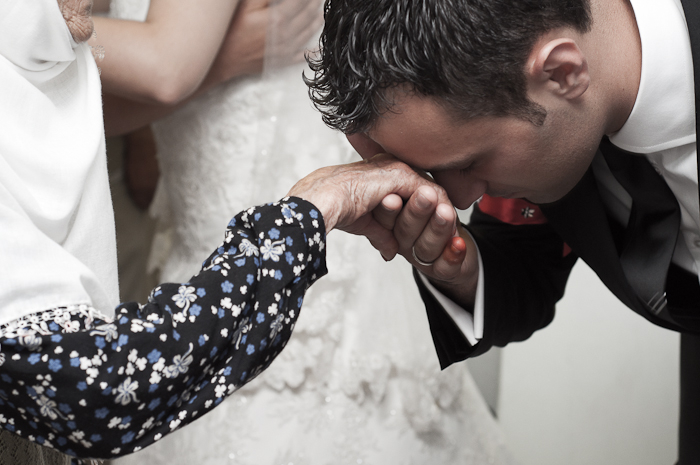
howinturkey.com 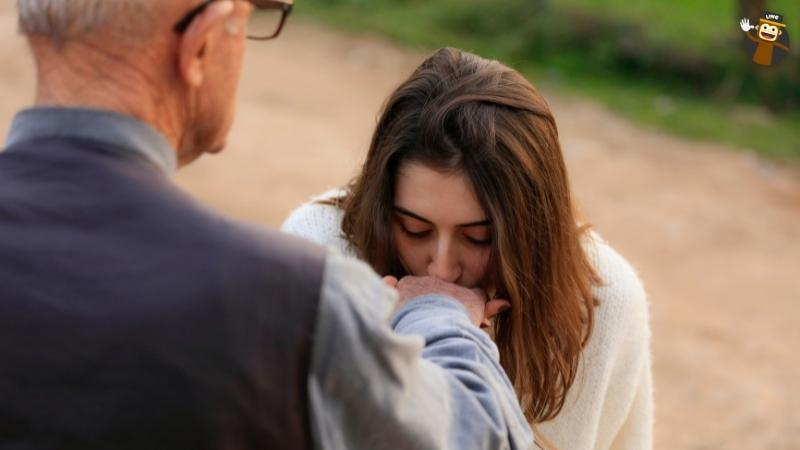
ling-app.com -
In Turkey, Muslims constitute 90% of the population. The country's primary religion is Islam. To be more specific, you will notice differences in the forms of Islam practiced. 70% of Muslims, or 90%, follow the Sunni faith. The remaining 20% are divided into several faiths, primarily Alevis, but also less common ideas like Sufi worshipping whirling derviches. The Alevis are a Muslim religious minority who are frequently considered heretics - a "Protestant equivalent" in Islam, if you will. Men are allowed to drink alcohol, women have rights, they do not worship in mosques, and the Koran is nothing more than ordinary man's words; as a result, they do not believe in succession. Even if there are no official statistics, estimates state that 15 million Turks are Alevi Muslims.
The whirling derviches are an unusual sight that you will be able to see during your trip to Turkey. Only in Istanbul and Konya will you find followers of this Sufi branch of Islam. Derviches twirl on the tip of their right foot to communicate with God. They can sometimes hold their arms out and rest their heads on their right shoulders for 30 minutes! It's a fascinating and mesmerizing sight, though nowadays it may appear to be more of a tourist attraction than a religious ceremony.
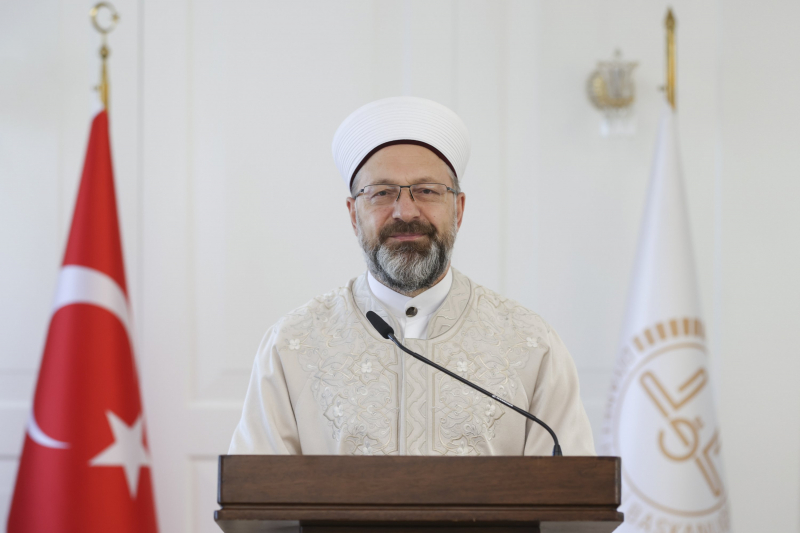
dailysabah.com 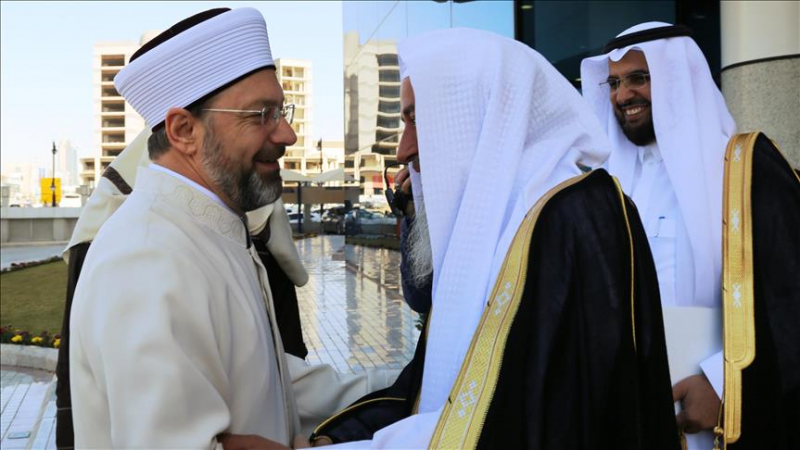
dailysabah.com -
The social stratification of the Turkish population is regarded as a Turkish tradition. Wealth and education are always regarded as the most important indicators of status. And if the first option is more or less obvious - Turks are very different from other peoples in the region in terms of their views on the role of money in society - the second option is far more intriguing.
University education is the minimum requirement for Turkish citizens to gain access to higher levels of society, regardless of their actual wealth. Previously, the high layers of society were represented by the Ottoman Empire's military and bureaucratic elite; however, "the focus of power" has clearly shifted to successful doctors, businessmen, politicians, and high-level officials. At the same time the "Westernization" of urban "upper class" is noticeable, the majority of whom speak at least one foreign language, they are familiar with the culture of the world and have close contact with foreign business, cultural and political circles.
However, the urban middle class (most government employees, small business owners, skilled workers, and students) has a strong affinity for Turkish culture, despite having a higher level of education than the upper class. This dualism, combined with the rapid population growth that is migrating to cities from the province, results in the formation of a very multi-faceted and mobile society that is characteristic of any Turkish city.
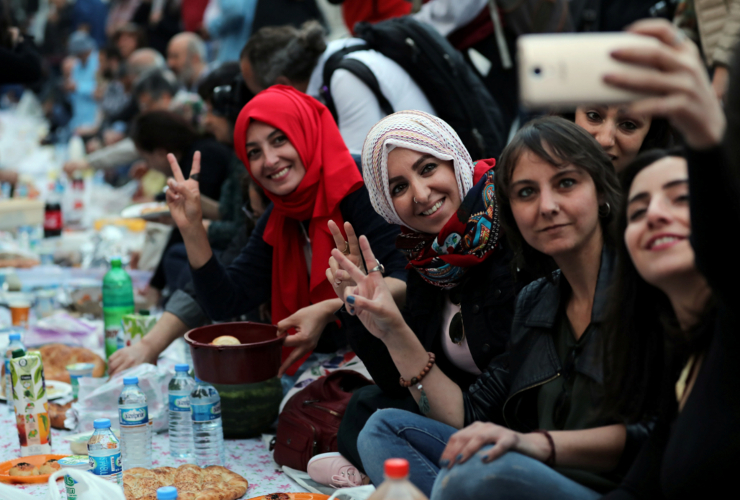
istockphoto.com 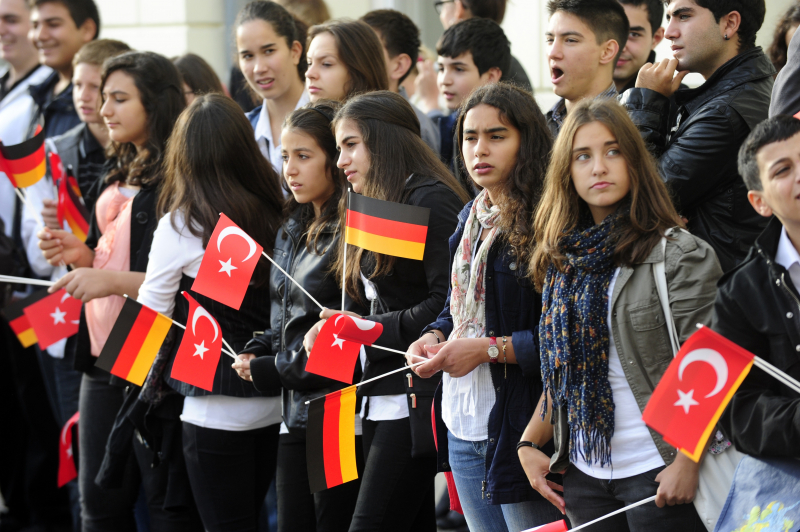
resetdoc.org -
Marriage at a young age is very common in Turkish traditions and customs. Marriages between members of different social groups are uncommon because it is believed that a man should not lower his wife's standard of living. However, unions within one religious or ethnic group are very common, and inter-ethnic marriages are not uncommon.
The Turkish Islamic family code was abolished by the revolutionary government in 1926, and a slightly modified version of the Swiss Civil Code was adopted. The new family law recognizes only civil marriage ceremonies, both parties' mandatory consent, contract conclusion, and monogamy. However, in traditional Turkish society, the choice of future spouses and the location of the marriage ceremony is still made solely by the heads of families, with the newlyweds playing only a minor role. In this regard, all rituals are regarded as extremely important, as is the imam's blessing of the marriage. In terms of Turkish wedding traditions and customs, weddings here last several days and consist of several ceremonies that usually involve all family members and, in some cases, all residents across the street or even the entire village.
In Islamic tradition, the groom must pay the bride price, but in recent years, this tradition has faded - the amount of "bride price" (kalim) is being reduced based on wedding expenses or total family income, or simply transferred to the newlyweds to start their own family. Simultaneously, in provincial patriarchal communities, money raised to buy pride can be a serious impediment to marriage.
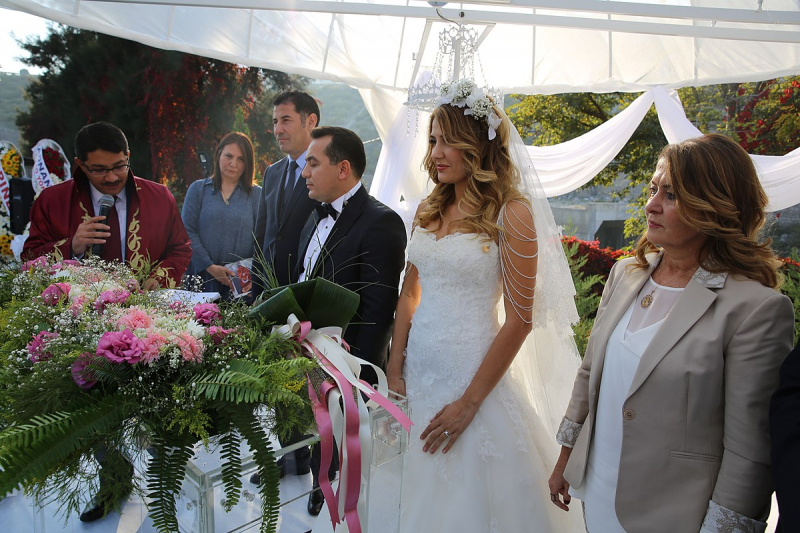
en.wikipedia.org 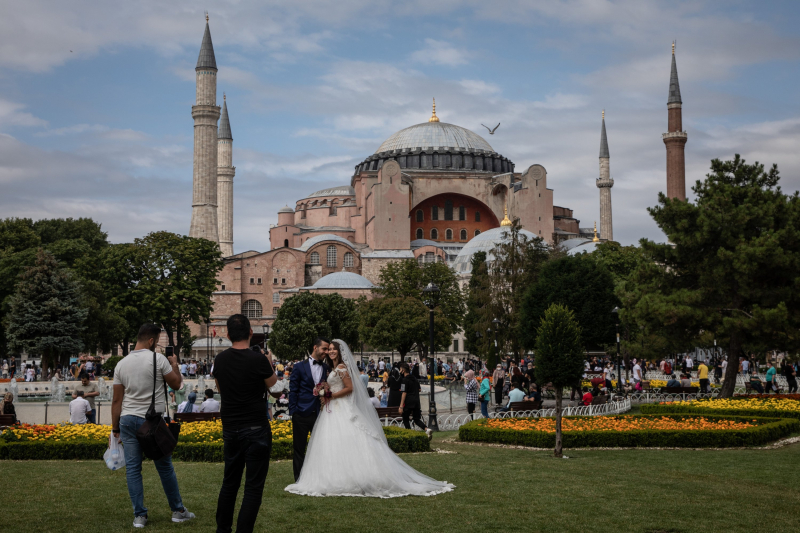
dailysabah.com -
It is worth noting that Turks never eat alone and do not snack on the go. They typically eat three times per day, preferring to do so as a family. Bread, cheese, olives, and tea are typical Turkish breakfast items. Lunch is usually served late in the afternoon, after all family members have gathered. The lunch menu typically consists of three or more meals eaten in succession, with each dish served with lettuce or other greens. It is customary to invite guests, neighbors, and friends to dinner, but in this case, the meal and time are pre-arranged.
Despite Islamic prohibitions on drinking alcohol at dinner, raki (anisette), wine, or beer are frequently served (in most of the country it is not considered as an alcoholic beverage). In this case, meze - a variety of snacks (fruit, vegetables, fish, cheese, meats, sauces, and fresh bread) served on small plates - is a must-serve meal. Turkish meze is usually followed by the main course, which is chosen to complement the variety of snacks - a kebab is served with vegetable salads, fish or chicken is served with rice or hummus, and tortillas with meat, cheese, and pickles are served with soup.
It is considered impolite to consume alcoholic beverages, even beer, in public. In Turkey, it is illegal to sell alcohol in public places. At the same time, alcohol beverages are sold almost freely in many shops, with the exception of Ramadan, when shelves with them are closed or blocked.
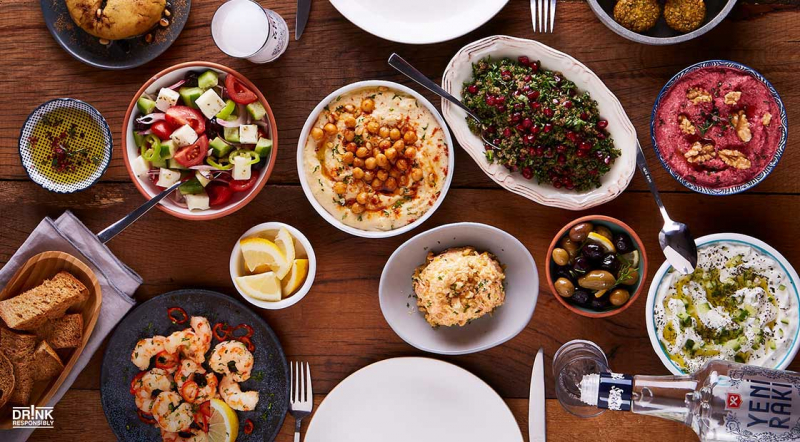
bohemianbaklava.com 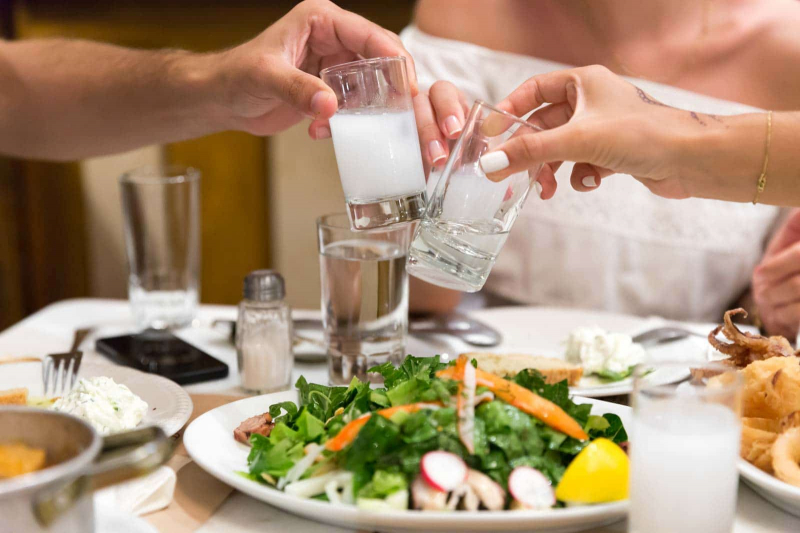
yenirakiglobal.com -
Turkey's clothing policy is relatively liberal, and it incorporates significant elements of Islamic tradition. Men's business suits, jackets, and ties are common in the business world, and many Turks prefer them to national dress during celebrations and national holidays. However, women approach the subject more creatively - in everyday life, the national costume retains its position, particularly in the provinces, and for feasts, Turkish women prefer their colorful and very practical to local conditions dress supplemented with various accessories.
Tourists visiting Turkey do not need to worry about their attire; they can wear almost anything that is appropriate for the local hot and dry climate. However, when visiting places of worship and provincial areas, it is preferable to dress modestly - shorts, short skirts, and open dresses are frowned upon almost everywhere other than beach areas.
Women should wear clothing that covers their legs and bodies up to the head and wrists when visiting mosques and temples; they should not wear miniskirts or pants. Men are advised to avoid wearing shorts. Only women with their heads covered are permitted to enter the territory of all temples (at the entrance you can rent a headscarf and long skirt). When visiting the mosque, visitors should leave their shoes at the door. It is preferable not to visit the mosque during prayers.
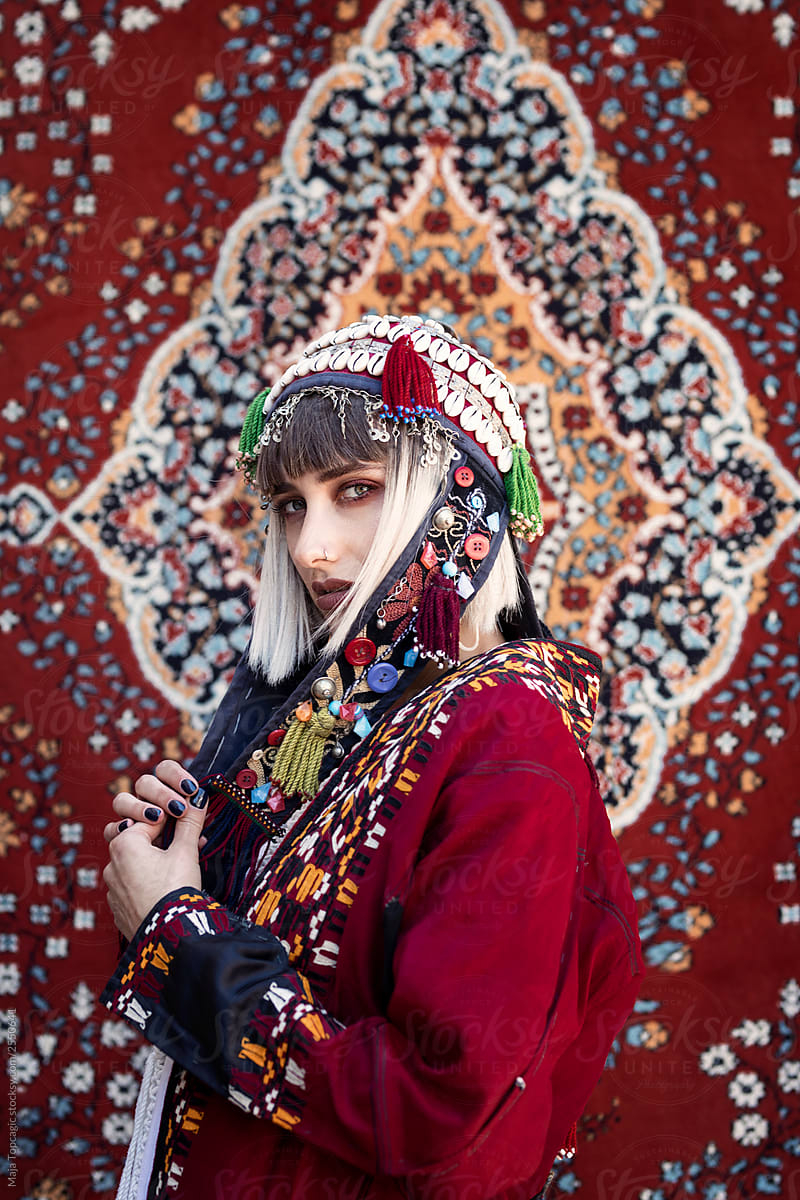
stocksy.com 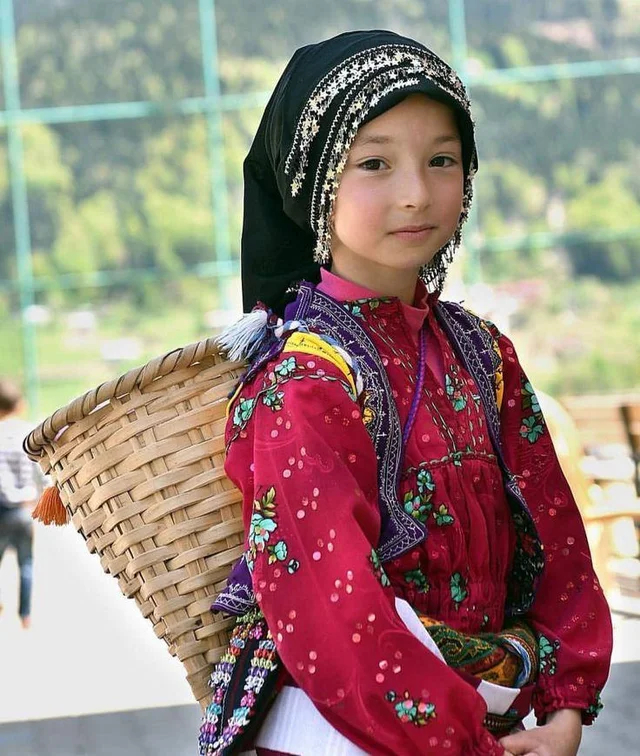
http://inutoneko.info/ -
There are four interesting traditional Sports d in Turkey that reflects its distinguished culture, customs, and traditions from the other countries, in addition to the difference in the traditional sports held in it.
Bullfighting:
- Bullfighting is one of Turkey's most unique traditional sports, dating back thousands of years to the presence of Turkish tribes who used to participate in this sport in the city of Artwin in north-eastern Turkey, which is 8 kilometers from Artoyn province in Turkey's Black Sea region.
- This type of wrestling is considered a distinctive feature throughout the region, as many people travel from other cities to participate in this entertainment, which is held alongside bullfights, folk dances, and poetry recitation. Every year in the third week of June, the huge bulls fight each other, and the winning bull works to chase the opponent out of the ring first.
Use of Spear on Horse:
- In Turkey, the use of Spear on Horse sport is unusual; it is a difficult sport that requires riding on horseback and scoring points by throwing a sharp wooden spear at a specific point.
- As a result, it requires a lot of strength and focus. This sport was very popular throughout Anatolia 50 to 60 years ago, but it was banned in 1826 by Sultan Mahmud II, who saw it as a very dangerous sport. Even 50 years ago, it was regularly performed at events and celebrations in cities such as Erzurum and Kars in eastern Turkey, Konya in central Anatolia, and Balkesir on the Aegean Sea.
Oil Wrestling:
- Oil wrestling is a Turkish national competitive sport and one of the most popular sports in Turkey. It is also the world's oldest manifestation of sport, with a history dating back over 650 years.
- This sport is held annually and is one of the most difficult sports in which wrestlers wear tight shorts made of buffalo leather up to They weigh 13 kilograms, and they anoint their bodies with olive oil, which makes catching and putting the opponent on the ground difficult.
Camel Wrestling:
- Camel wrestling is an ancient tradition with a history dating back hundreds of years in Turkey's Aegean and Mediterranean cities, and it is one of the most popular sports in the country.
- Camel wrestling follows certain rules and is usually held as a winter festival from December to March, and it is believed that this sport originated with the Bedouin tribes who rely on camels for a living.
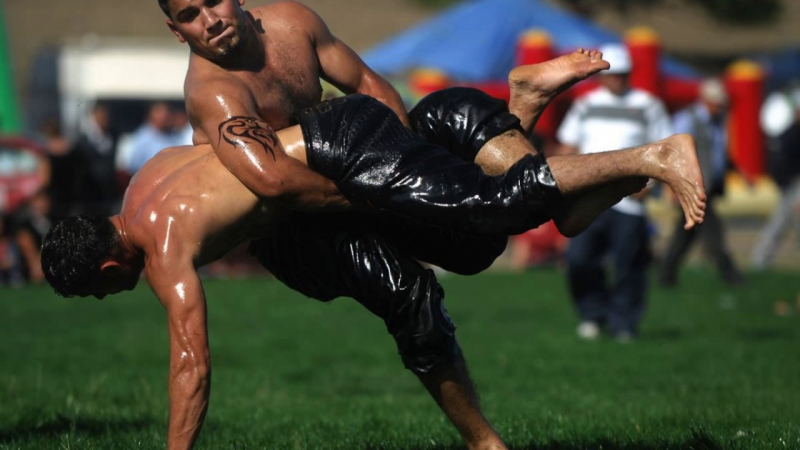
youtube.com 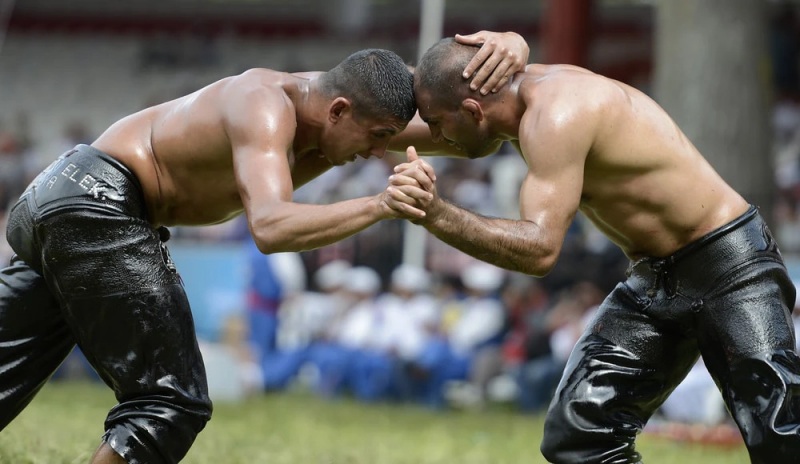
theculturetrip.com - Bullfighting is one of Turkey's most unique traditional sports, dating back thousands of years to the presence of Turkish tribes who used to participate in this sport in the city of Artwin in north-eastern Turkey, which is 8 kilometers from Artoyn province in Turkey's Black Sea region.
-
Horon, or the round dance, is a traditional Black Sea folk dance. The ancient koron-horon, which originated in pagan worship, was a sacred ritual dance performed solely by men. The Horon is typically danced by a chain of men or women in a line or semi-circle. The Horon has a fast shoulder shimmy (tremoulo) and a trembling of the entire body and sudden squats, with Mustafa Kemal Atatürk dancing the Zeybek in Bursa at the last ball he ever attended before his death eight months later.
Horons are danced to the music of the cura zurna, the cura davul, the tulum, the kemence, the koltuk davulu, and even the accordion. Long sea voyages, merchant exchanges, and troops en route to the Holy Land are said to have been exposed to these dance styles. The Irish jig and even its modern incarnation, the River Dance, are thought to have their origins in the Horon. The Horon, though modified from its Pagan origins, is still performed and distinguished by its music, raised arms, shimmy's, and kicks.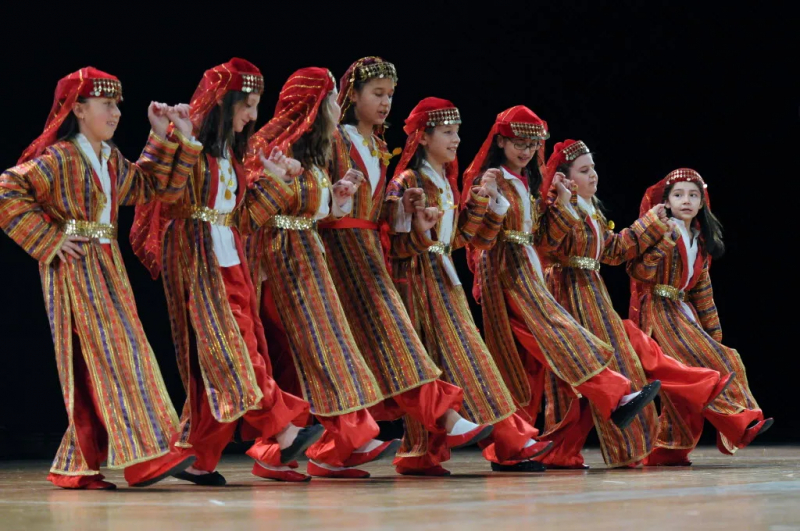
http://inutoneko.info/ Turkish Folk Dances - HORON






























